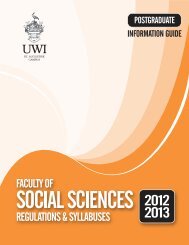Faculty of Humanities and Education (Postgraduate) - The University ...
Faculty of Humanities and Education (Postgraduate) - The University ...
Faculty of Humanities and Education (Postgraduate) - The University ...
You also want an ePaper? Increase the reach of your titles
YUMPU automatically turns print PDFs into web optimized ePapers that Google loves.
134<br />
POSTGRADUATE REGULATIONS & SYLLABUSES 2012 - 2013<br />
THE FACULTY OF HUMANITIES & EDUCATION<br />
YEAR:<br />
SEMESTER:<br />
COURSE CODE: EDSC 6005<br />
COURSE TITLE: LEADERSHIP IN SCIENCE EDUCATION<br />
NUMBER OF CREDITS: 4<br />
COURSE DESCRIPTION:<br />
Rationale<br />
Modern approaches to the development <strong>of</strong> school science<br />
curricula put students at the centre <strong>of</strong> the teaching/learning<br />
process, <strong>and</strong> they emphasize the learning <strong>of</strong> science though<br />
methods such as inquiry-based <strong>and</strong> problem-based learning.<br />
<strong>The</strong>se new trends require a new thinking <strong>and</strong> the development<br />
<strong>of</strong> new skills on the part <strong>of</strong> many science teachers. <strong>The</strong>re is a<br />
clear need, then, for science teachers to be equipped to function<br />
as change agents <strong>and</strong> instructional leaders <strong>and</strong> to coordinate<br />
the curricular activities <strong>of</strong> science departments in schools. This<br />
course seeks to empower science teachers to take leadership<br />
roles in designing <strong>and</strong>/or modifying curricula in line with current<br />
perspectives in science education. Science teachers will also<br />
learn to develop plans for supporting <strong>and</strong> mentoring beginning<br />
science teachers in an environment that is collaborative <strong>and</strong><br />
collegial.<br />
OBJECTIVES<br />
At the end <strong>of</strong> this course, participants will:<br />
• have the disposition to access, critically review,<br />
<strong>and</strong> disseminate information pertaining to current<br />
developments in the field <strong>of</strong> science <strong>and</strong> science<br />
education<br />
• be able to function as leaders in the design, development,<br />
<strong>and</strong> implementation <strong>of</strong> inquiry-based <strong>and</strong> problem-based<br />
science curricula, units, <strong>and</strong> lessons<br />
• function as reflective practitioners<br />
• appreciate the need for continuous pr<strong>of</strong>essional<br />
development<br />
• be able to organise mentoring plans for the science<br />
department<br />
• be able to create environments that are conducive to<br />
collaboration in the teaching <strong>and</strong> learning <strong>of</strong> science<br />
CONTENT<br />
• Basic principles <strong>and</strong> procedures for curriculum design <strong>and</strong><br />
implementation<br />
• Science st<strong>and</strong>ards (aims, goals <strong>of</strong> science teaching<br />
in relation to goals <strong>of</strong> science education)<br />
• Innovative approaches in teaching <strong>and</strong> learning science<br />
(e.g., inquiry-based <strong>and</strong> problem-based approaches)<br />
• Managing change<br />
• Perspectives on leadership <strong>and</strong> related theories<br />
• Designing mentoring plans<br />
• Teacher as reflective practitioner<br />
• Classroom observation (including pre <strong>and</strong><br />
post conferences, etc.)<br />
• Collaborative approaches in the teaching/learning <strong>of</strong><br />
science (peer coaching, team teaching, etc.)<br />
MAJOR COMPETENCIES TO BE DEVELOPED<br />
• Curriculum planning skills<br />
• Leadership skills<br />
• Mentoring skills<br />
• Independent <strong>and</strong> collaborative problem solving.<br />
ASSESSMENT<br />
• Examination (3 hours) 60%<br />
• Course work 40%<br />
RECOMMENDED READING<br />
Caillods, F., Gottelmann-Duret, G., & Lewin, K. (1997). Science<br />
education <strong>and</strong> development: Planning <strong>and</strong> policy issues at<br />
the secondary level. Paris: UNESCO.<br />
Davies, B., & Ellison, L. (1999). School leadership for the 21 st<br />
century: A competency <strong>and</strong> knowledge approach. London:<br />
Routledge.<br />
Dillon, J. (2000). Managing student teachers’ development.<br />
In R. Millar, J. Leach, & J. Osborne (Eds.), Improving science<br />
education: <strong>The</strong> contribution <strong>of</strong> research (pp. 94-109).<br />
Buckingham: Open <strong>University</strong> Press.<br />
Gilbert, L. (2005). What helps beginning teachers? <strong>Education</strong>al<br />
Leadership, 62(8), 36-39.<br />
Howe, A. C., & Stubbs, H. S. (2003). From science teacher to teacher<br />
leader: Leadership development as meaning making in a<br />
community <strong>of</strong> practice. Science <strong>Education</strong>, 87(2), 281-297.<br />
Scherer, M. (Ed.). (1999). A better beginning: Supporting <strong>and</strong><br />
mentoring new teachers. Alex<strong>and</strong>ria, VA: Association for<br />
Supervision <strong>and</strong> Curriculum Development.<br />
Shank, M. J. (2005). Common space, common time, common<br />
work. <strong>Education</strong>al Leadership, 62(8), 16-1<br />
YEAR:<br />
SEMESTER:<br />
COURSE CODE: EDRS 6203<br />
COURSE TITLE: GRADUATE RESEARCH SEMINARS<br />
NUMBER OF CREDITS: PASS/FAIL<br />
Each Master student is required to present the proposal for<br />
his/her research project to fellow students <strong>and</strong> academic<br />
staff members at a Graduate Research Seminar. <strong>The</strong> student is<br />
provided with feedback by way <strong>of</strong> questions <strong>and</strong> comments.<br />
<strong>The</strong> intention is to provide a forum in which the student could<br />
articulate his/her plans for research <strong>and</strong> also receive suggestions<br />
<strong>and</strong> comments about such plans.<br />
Students are expected to attend at least 75% <strong>of</strong> the seminars<br />
over the two-year period during which the Master Programme<br />
is <strong>of</strong>fered.

















